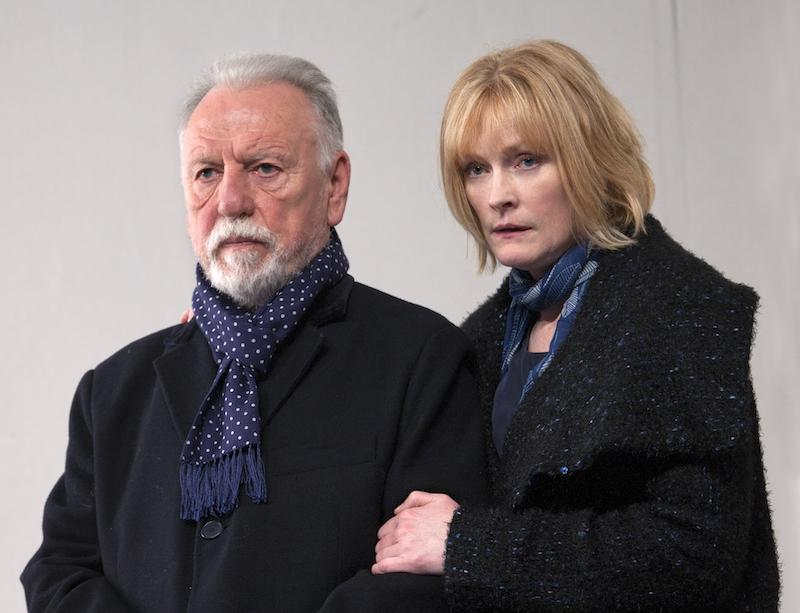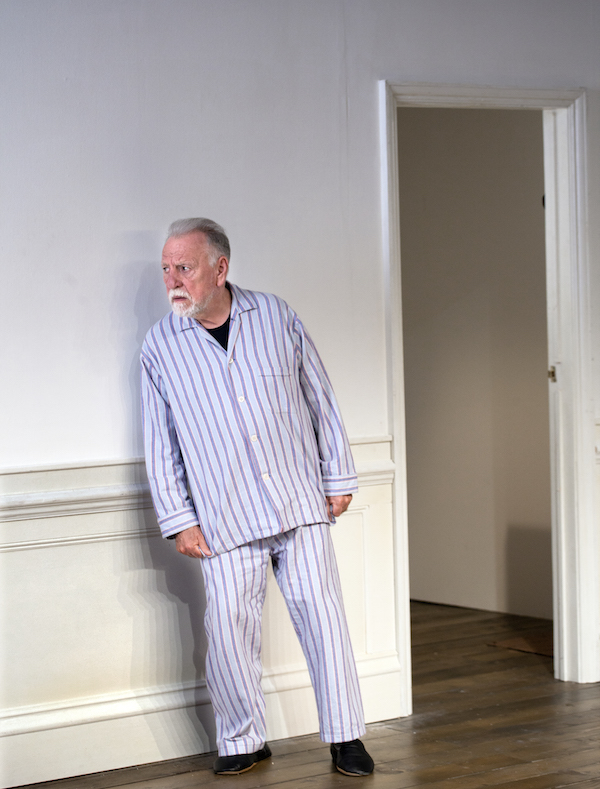The Father, Tricycle Theatre | reviews, news & interviews
The Father, Tricycle Theatre
The Father, Tricycle Theatre
Brutally honest portrait of dementia is unmissable theatre

André is losing time. It’s not just his perennially mislaid watch, but whole hours, weeks, years. Is he still living in his Paris flat, or did he move in with his daughter Anne? Is she married, divorced, leaving the country with a new boyfriend? And why does that nurse she’s forced on him – the third one, or is it the first? – remind him so strongly of his other daughter, whose unexplained absence is just one of the memories slipping through his fingers like sand?
The stark, inescapable power of Florian Zeller’s Molière Award-winning play, meticulously translated by Christopher Hampton, is that dementia sufferer André’s dislocation is not passively related; we experience first-hand its cold horror. The set-up is deceptively simple: Anne (Claire Skinner) visits her father (Kenneth Cranham, pictured below) in his chic apartment to tell him she and her partner are moving to London. Moments later, she’s played by another actress and is married. Then the flat is hers, shared with a boyfriend. Familiar faces shift into a succession of carers, while furniture moves and vanishes. As André loses his grasp on reality, so do we.
 This immersive disorientation is immaculately delivered by James Macdonald’s measured 90-minute production, now at the Tricycle after an acclaimed Bath run (the second Theatre Royal London transfer this week following Hay Fever). Other than some welcome black humour and a few thriller tropes, the subdued naturalism offers little relief – this is an almost unbearably devastating watch. Pinter’s influence is apparent in the shifting power dynamics, elusive history and menace lurking beneath the mundane, and a spare script lends weight to innocuous, oft-repeated phrases whose sense stutters and stalls like the piano music fracturing between scenes.
This immersive disorientation is immaculately delivered by James Macdonald’s measured 90-minute production, now at the Tricycle after an acclaimed Bath run (the second Theatre Royal London transfer this week following Hay Fever). Other than some welcome black humour and a few thriller tropes, the subdued naturalism offers little relief – this is an almost unbearably devastating watch. Pinter’s influence is apparent in the shifting power dynamics, elusive history and menace lurking beneath the mundane, and a spare script lends weight to innocuous, oft-repeated phrases whose sense stutters and stalls like the piano music fracturing between scenes.
“O, let me not be mad!” begged Lear, and the diminishment of Cranham’s pyjama-clad patriarch is no less powerful for its relative modesty. Anne remembers him as a man of authority, someone to be feared, but in a painful regression and reversal, the parent becomes a child – “Little Daddy” – sobbing for his mother and cringing from possibly real abuse. But Cranham is no benign dodderer. His mesmerising André is alternately charming, belligerent, sly, paranoia growing out of detection of condescension and conspiracy surrounding him.
Though André’s perspective is prioritised, we glimpse, too, the effects of his casual cruelty, not least the demonisation of Anne, dutiful but second-placed daughter. Skinner sympathetically evokes that thankless sacrifice, as well as its inevitable breaking point. Jim Sturgeon and Colin Tierney, the men in her life, chillingly switch between polite patience and threat, and Jade Williams and Rebecca Charles are similarly versatile in multiple roles. Even when André isn’t present, ambiguity is retained, removing the security of viewer objectivity.
Miriam Buether’s increasingly minimalist set is a striking visual metaphor of André’s loss: of everything, everyone, and finally himself. That grief has a climactic expression, but no escape. You will carry it with you when you leave the theatre.
rating
Explore topics
Share this article
The future of Arts Journalism
You can stop theartsdesk.com closing!
We urgently need financing to survive. Our fundraising drive has thus far raised £49,000 but we need to reach £100,000 or we will be forced to close. Please contribute here: https://gofund.me/c3f6033d
And if you can forward this information to anyone who might assist, we’d be grateful.

Subscribe to theartsdesk.com
Thank you for continuing to read our work on theartsdesk.com. For unlimited access to every article in its entirety, including our archive of more than 15,000 pieces, we're asking for £5 per month or £40 per year. We feel it's a very good deal, and hope you do too.
To take a subscription now simply click here.
And if you're looking for that extra gift for a friend or family member, why not treat them to a theartsdesk.com gift subscription?
more Theatre
 The Producers, Garrick Theatre review - Ve haf vays of making you laugh
You probably know what's coming, but it's such great fun!
The Producers, Garrick Theatre review - Ve haf vays of making you laugh
You probably know what's coming, but it's such great fun!
 Not Your Superwoman, Bush Theatre review - powerful tribute to the plight and perseverance of Black women
Golda Rosheuvel and Letitia Wright excel in a super new play
Not Your Superwoman, Bush Theatre review - powerful tribute to the plight and perseverance of Black women
Golda Rosheuvel and Letitia Wright excel in a super new play
 Cow | Deer, Royal Court review - paradox-rich account of non-human life
Experimental work about nature led by Katie Mitchell is both extraordinary and banal
Cow | Deer, Royal Court review - paradox-rich account of non-human life
Experimental work about nature led by Katie Mitchell is both extraordinary and banal
 Deaf Republic, Royal Court review - beautiful images, shame about the words
Staging of Ukrainian-American Ilya Kaminsky’s anti-war poems is too meta-theatrical
Deaf Republic, Royal Court review - beautiful images, shame about the words
Staging of Ukrainian-American Ilya Kaminsky’s anti-war poems is too meta-theatrical
 Laura Benanti: Nobody Cares, Underbelly Boulevard Soho review - Tony winner makes charming, cheeky London debut
Broadway's acclaimed Cinderella, Louise, and Amalia reaches Soho for a welcome one-night stand
Laura Benanti: Nobody Cares, Underbelly Boulevard Soho review - Tony winner makes charming, cheeky London debut
Broadway's acclaimed Cinderella, Louise, and Amalia reaches Soho for a welcome one-night stand
 The Pitchfork Disney, King's Head Theatre review - blazing with dark energy
Thrilling revival of Philip Ridley’s cult classic confirms its legendary status
The Pitchfork Disney, King's Head Theatre review - blazing with dark energy
Thrilling revival of Philip Ridley’s cult classic confirms its legendary status
 Born with Teeth, Wyndham's Theatre review - electric sparring match between Shakespeare and Marlowe
Rival Elizabethan playwrights in an up-to-the-minute encounter
Born with Teeth, Wyndham's Theatre review - electric sparring match between Shakespeare and Marlowe
Rival Elizabethan playwrights in an up-to-the-minute encounter
 Interview, Riverside Studios review - old media vs new in sparky scrap between generations
Robert Sean Leonard and Paten Hughes make worthy sparring partners
Interview, Riverside Studios review - old media vs new in sparky scrap between generations
Robert Sean Leonard and Paten Hughes make worthy sparring partners
 Fat Ham, RSC, Stratford review - it's Hamlet Jim, but not as we know it
An entertaining, positive and contemporary blast!
Fat Ham, RSC, Stratford review - it's Hamlet Jim, but not as we know it
An entertaining, positive and contemporary blast!
 Juniper Blood, Donmar Warehouse review - where ideas and ideals rule the roost
Mike Bartlett’s new state-of-the-agricultural-nation play is beautifully performed
Juniper Blood, Donmar Warehouse review - where ideas and ideals rule the roost
Mike Bartlett’s new state-of-the-agricultural-nation play is beautifully performed
 The Gathered Leaves, Park Theatre review - dated script lifted by nuanced characterisation
The actors skilfully evoke the claustrophobia of family members trying to fake togetherness
The Gathered Leaves, Park Theatre review - dated script lifted by nuanced characterisation
The actors skilfully evoke the claustrophobia of family members trying to fake togetherness
 As You Like It: A Radical Retelling, Edinburgh International Festival 2025 review - breathtakingly audacious, deeply shocking
A cunning ruse leaves audiences facing their own privilege and complicity in Cliff Cardinal's bold theatrical creation
As You Like It: A Radical Retelling, Edinburgh International Festival 2025 review - breathtakingly audacious, deeply shocking
A cunning ruse leaves audiences facing their own privilege and complicity in Cliff Cardinal's bold theatrical creation

Add comment